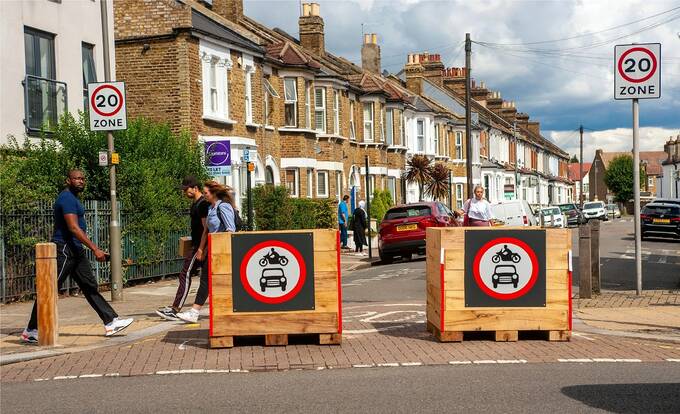Local communities to decide on road safety schemes, says Secretary of state for Transport

Transport Secretary Louise Haigh has said decisions on introducing road calming and safety schemes, such as 20mph zones, should remain with local communities rather than her department.
Low-Traffic Neighbourhoods (LTNs) became a political issue under the previous government, when Prime Minister Rishi Sunak called such schemes "hare-brained" and ordered a review.
Conservative ministers had sought to tighten up rules to ensure councils had the support of local residents and businesses.
The new Labour transport secretary told the Streets Ahead podcast: "Local authorities will have my full support to roll out schemes."
In March, the Department for Transport published draft statutory guidance for councils which said LTNs could provide "some benefits" and stressed the importance of "engaging effectively with the whole community" over proposals.
LTNs are aimed at reducing traffic in residential streets, and improving access for pedestrians and cyclists with dedicated lanes, wider pavements and planters blocking off vehicle access.
They have been set up in recent years in London, Bristol, Birmingham, Bournemouth and more cities, with tens of millions of pounds of government funding provided to councils since 2020 - although about a quarter of them were later scrapped.
Speed limits of 20mph are designed to reduce the severity of injuries suffered in accidents.
Ms Haigh said she wanted to move away from the "culture wars" of the previous government.
That government, she said, had invested heavily in active travel during the Covid pandemic but had then taken "the money away again", leaving many local authorities "in limbo and paralysis".
"It’s really, really difficult for local authorities when they’ve not got that air cover from government," she said.
"And not only did they not have the air cover, they had the government actively working against them saying ’No, you’re not allowed to roll out 20mph zones, no, you’re not allowed to roll out LTNs’.
"Those kinds of decisions should absolutely be made at a local level by communities and not dictated to or stoked up by the centre."
While pledging her support for local authorities to roll out schemes, she added: "It all has to be done with communities, absolutely, and the worst thing you can do is put the wrong schemes in because then it erodes that support and they can be unsafe in some circumstances."
Funding would, she said, be considered in the budget and comprehensive spending review.
"We’re certainly not shying away from the target of getting 50% short journeys walking and cycling and that will have to be delivered by local authorities, so anybody who wants to do that work, they’ll have the Department for Transport’s full backing," she said.
"There’s no way me sitting in my office in the DfT can say ’This road in Chester should be a 20mph road or not’, it’s completely ridiculous, so if they want to do that then that’s got my full backing," the transport secretary added.
Interviewed by the Sun last year, Mr Sunak said a clampdown on drivers was "an attack on the day-to-day lives of most people... who rely on cars to get to work or see their families".
In Wales, the government has been reviewing its decision to reduce the default speed limit from 30mph to 20mph for restricted roads.
The 20mph policy was introduced last year with the aim of improving road safety.
Read more similar news:
Comments:
comments powered by Disqus

































